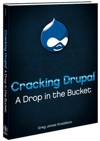The Book, The Report
Cracking Drupal: A Drop in the Bucket
Written by a Drupal expert, this is the first book to reveal the vulnerabilities and security issues that exist in the sites that have been built with Drupal and how to prevent them from continuing.
Drupal Security White Paper
Curious about Drupal's security? Consider Drupal but want to make sure it's good enough? Read the Drupal Security Report
Security Review Service
If you are concerned about whether your site is secure, consider using the Security Review Module to get an initial sense. If you're looking for something much more in depth than a module or a book, Growing Venture Solutions offers a Security Review Service for Drupal Sites.
Recent Blog Posts
-
Posted by Ben Jeavons6 comments
-
Posted by greggles4 comments
-
Posted by greggles0 comments

